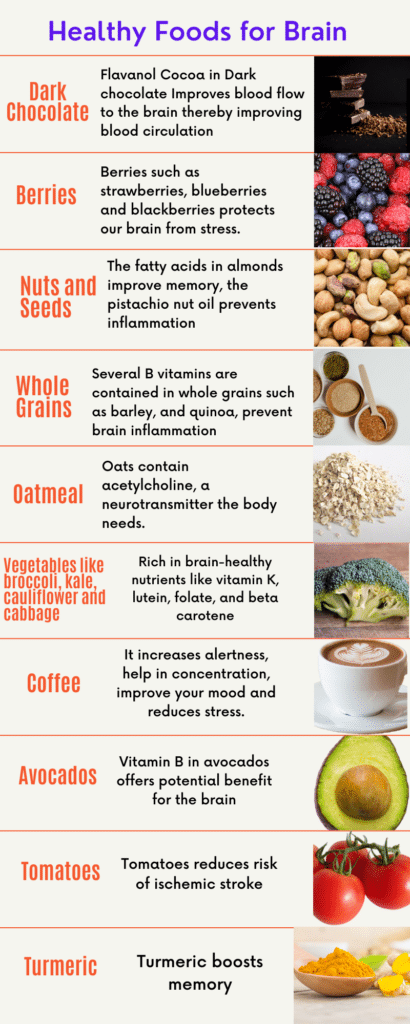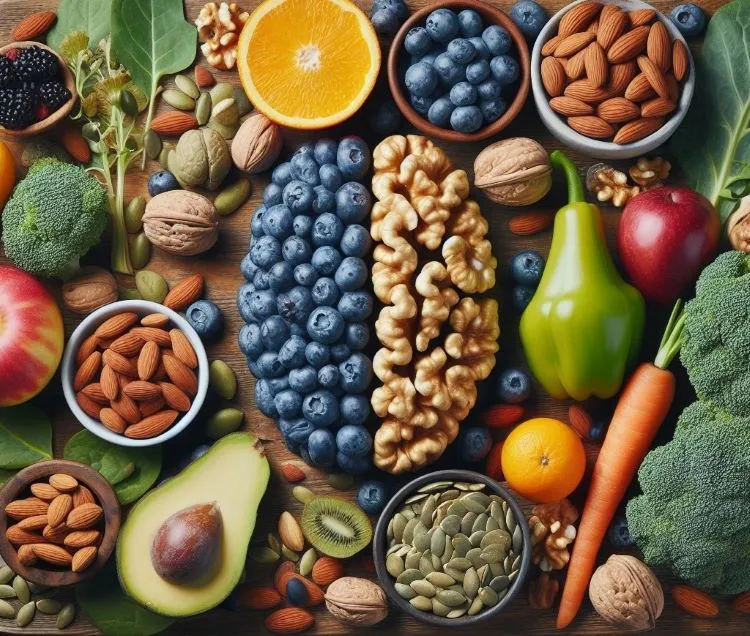Is there ever a time when you didn’t eat for long hours and suddenly started experiencing headaches? It is your brain that gives you a signal that you are hungry. Additionally, there is a list of Healthy brain foods that helps with brain health. Likewise, our mood change depends upon what we eat.
What is the relation between food and mood?
The connection between food and our overall well-being is undeniable. It’s not just about satisfying our hunger; what we consume can have a profound impact on our mood, emotional well-being, and mental health. The saying “you are what you eat” holds true as the nutrients we provide our bodies play a crucial role in maintaining optimal mental and emotional balance.
Research has shown that certain foods can affect neurotransmitter levels in the brain, influencing our mood and emotions. For example, foods rich in omega-3 fatty acids, such as salmon and walnuts, have been found to reduce symptoms of depression and anxiety. Similarly, complex carbohydrates found in whole grains can boost serotonin production, which helps regulate mood and promote feelings of calmness.
Moreover, a healthy diet that includes an abundance of fruits, vegetables, and whole grains provides essential vitamins and minerals that support brain function. Nutrients like B vitamins help produce neurotransmitters while antioxidants protect against oxidative stress that can lead to mental decline.
On the flip side, consuming an unhealthy diet high in processed foods loaded with sugar and saturated fats has been linked to increased risk of depression and other mental health disorders. These foods may provide temporary comfort or pleasure but often lead to energy crashes and feelings of lethargy or irritability.
It’s worth noting that food is not a magical cure-all for mental health issues. However, incorporating a balanced diet into one’s lifestyle can be an important part of overall self-care practices for emotional well-being.
Food is like fuel to our body as well as our mind. It has an impact on our overall health and thinking and also increases energy levels.
If we talk scientifically, our brain is made up of cells called ‘neurons’, which play a major role in its functioning.
Nutrients for a healthy mood
All nutrients play a vital role in brain development and its functioning. Below are some nutrients which keep our minds cool and healthy:-
Iron, Magnesium, Zinc, Potassium, Vitamin A, Vitamin C, Vitamin B6, and Vitamin B12.
Is there any food that needs to be avoided?
YES. One should avoid or limit sugary food, sugar-sweetened beverages such as soda, and eating too much junk food.
In addition to this, other factors equally important are getting enough sleep and managing stress.
Benefits of eating vegetarian food for brain health
- It helps to improve the quality of sleep.
- It helps in Increase in concentration.
- It helps to boost energy levels. The more energy we have, the better our mood is. No one wants to be tired all day anyway? Right?
- It shows compassion towards animals.
- Eating plant-based foods lowers cortisol level, which in turn lowers stress levels.
Cortisol is a stress hormone, and high levels of cortisol can have negative impacts on your mental and physical health. Foods like leafy greens, bananas, oranges, melons, and even dark chocolate lowers cortisol levels. It is proven that whatever we eat not only has an effect on our body but also to our mind.
10 BEST FOODS FOR BRAIN HEALTH
Foods that are best to eat for brain health are Dark Chocolate, Berries, Nuts and Seeds, Whole Grains, Oatmeal, Vegetables like broccoli, kale, cauliflower and cabbage, Coffee, Avocados, Tomatoes and Turmeric. Let’s discuss one by one in detail.
1. Dark Chocolate
Who doesn’t love dark chocolate. But do you know what dark chocolate do to your brain? Flavanol Cocoa in Dark chocolate Improves blood flow to the brain thereby improving blood circulation. It also lowers Heart problems such as increase in Blood Pressure. So lets have some dark chocolate now!
2. Berries
All the Berries such as strawberries, blueberries and blackberries can protect our brain from stress. They are rich in antioxidants.
In addition to protecting the brain from oxidative stress, berry compounds counteract advanced glycation end products.
Disclaimer:-“As an Amazon Associate, I earn from qualifying purchases.”
3. Nuts and Seeds such as peanuts, walnuts and almonds
The fatty acids in almonds improve memory, the pistachio nut oil prevents inflammation, and the macadamias help keep the brain healthy.
4. Whole Grains, brown rice, whole grain bread
Several B vitamins are contained in whole grains such as oats, barley, and quinoa, which can potentially prevent brain inflammation. Eggs and egg yolks contain protein and vitamins B, D, and E, which may enhance memory function.
5. Oatmeal
Oatmeal fuels the brain and satisfies appetite, so you will be able to keep your body and mind in good working order all day long.
As well as choline, oats contain acetylcholine, a neurotransmitter the body needs. Memory and learning are both assisted by acetylcholine.
6. Vegetables like broccoli, kale, cauliflower and cabbage
Fruits and vegetables are high in vitamins, minerals, and antioxidants and it nourishes our body and boosts happiness. Leafy greens such as broccoli, kale, cauliflower and cabbage are rich in brain-healthy nutrients like vitamin K, lutein, folate, and beta carotene. Cortisol, a stress hormone, can be lowered by eating foods such as leafy greens, bananas, oranges, melons etc.
7. Coffee
Do you know that caffeine has many positive effects on the brain.. It increases alertness, help in concentration, improve your mood and reduces stress.
8. Avocados
Vitamin B in avocados offers potential benefit for the brain.
B vitamins can help to lower homocysteine levels. Homocysteine is an amino acid. High homocysteine levels may mean you have a vitamin deficiency. If it is not treated on time, it can increase the risk of heart disease.
9. Tomatoes
Harvard Health study found that tomatoes may reduce your risk of ischemic stroke, a type of stroke caused by the blockage of a brain artery. Tomatoes are a particularly good source of antioxidants: lycopene and beta-carotene. These antioxidants protect brain cells and prevent any damage.
10.Turmeric
Turmeric boosts memory and helps to pay attention. In the brain, curcumin boosts BDNF levels, which encourages the growth of new neurons and may fight degenerative processes. A hot glass of Turmeric milk at night can play an amazing role to your overall health.

Takeaway
In conclusion, the relationship between food and our mood is undeniable. Choosing nutritious options supports not only physical health but also contributes positively to mental well-being.
We have discussed 10 such foods that not only helps in stress management but also helps in improved sleep quality and more concentration.
By making conscious choices about what we eat, we empower ourselves to take control over our emotional state while nurturing both body and mind.
Brain health is equally important like physical health. The food that we eat plays a vital role in brain health. It impacts our mood and hence we should choose it wisely.
Unlock the power of food for a happier you!
ALSO SEE:
Low Sugar Fruits and Vegetables


Thankfulness to my father who stated to me concerning this website, this weblog is genuinely remarkable.
blaze
Excellent blog here! Also your website loads up fast!
What web host are you using? Can I get your affiliate link to your host?
I wish my website loaded up as quickly as yours lol
allwin